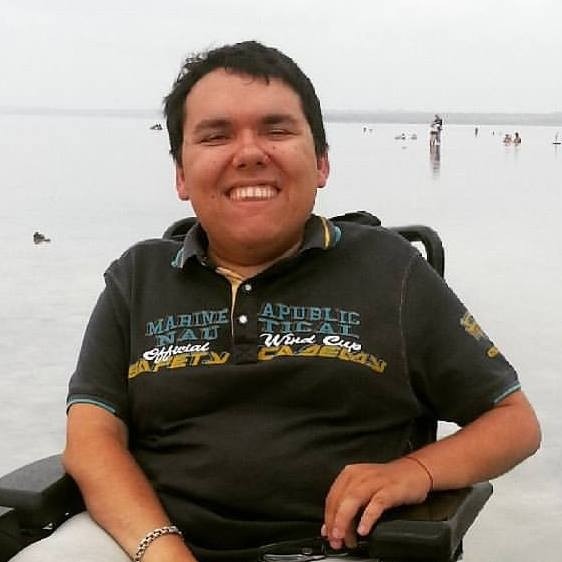
Early on the streets were people with disabilities. That is, they were lived, but the space was so not adapted to their movement that people stayed at home. Right now, all though slowly, but changing — the blind, people in wheelchairs lead an active lifestyle: walking, work, communicate, move around the city, take part in competitions. But often, in conversation with such people, the interlocutors become flustered, not knowing how to build a conversation, thereby confusing themselves and people with disabilities.
To help the parties, “Today” talked to different people with special health and learned how to talk to them, not to offend and to help when needed.
The most important rule: it is impossible to feel sorry for and sympathize with. Communicate on an equal footing, without “Oh, you poor thing”. It so happened that our environment is quite aggressive and unfriendly towards people with disabilities. Because they are usually very strong willed people who want that others do not focused on their features.
A CONVERSATION ON EQUAL TERMS
Communicating, don’t pick words specifically — use a common vocabulary. No need to talk to a man in a wheelchair “pass”, better — “pass on.” Blind better to say “look” not “touch”. Convulsive selection of the correct wording makes all the difference and can touch people. Separately it is necessary to make words that clearly hurt: “sick/healthy”, “normal/abnormal”, “complete/incomplete” and so Many people with special needs affects the wording “disabled”: better to say “people with disabilities” or “people with disabilities”. People with vision problems can’t stand the word “blind” in their understanding of this helpless person who can’t take care of themselves. Correct to say “the blind” or “visually impaired” (respectively, the person who is “sighted”).
During communication, please contact directly to the person, not an escort or a sign language interpreter. Once I went into a cafe with a blind friend, and the waiter, after hearing my order, he continued, turning to me: “he’s what?”. I had to explain that visually impaired people are perfectly capable of making the order and serve themselves.
When you are introduced — it is normal to shake hands, even to those who find it difficult to move. If the prosthesis is acceptable to shake left hand. Be patient: if a person has difficulty communicating, take the time. Try to listen carefully.
See also: Why kids with disabilities should be spared and as a boarding mutilate a child’s life: an interview with Wes Granger
Remember that what a person has a disability does not mean that he is interested to communicate only with a wheelchair or to listen to stories about health problems of your friends. Of course, they can talk to other people, for example, in a wheelchair, because there are common problems and topics of conversation, but they don’t have to be friends.
Don’t be afraid to tell the blind the plot of the new film, and the girl on the prostheses about choosing new shoes: normal people don’t throw a tantrum, they listen and communicate. But to ask about the injury that led to disability, is not: someone takes such a calm, but for many this question is very painful and it takes time and trust to learn about the person’s attitude and his reaction to such a question.
BLIND: GIVE FREEDOM
Anatoly Bartholomew, 29, a massage therapist, an athlete:
“The main thing is to give freedom of movement. It is very frustrating when you “grab and drag”. I can move independently, just help you navigate. Do not move things without warning: I will be hard to find the right one.
During a conversation, introduce yourself and I can recall where we had met and under what circumstances. If you accompany a blind, that is, when he’s holding you by the elbow and behind a half step. So the person “feels” the road and can navigate curbs, steps, etc., even if you forget to warn him. When you go along, indicate in the space: “step up/down”, “border”, “ramp”.

DEAF: SPEAK CLEARLY
Gregory Guk, 24 years, works as a choreographer:
“I am in the world of the deaf and hard of hearing. So I can smoothly transition from sign language to speech and Vice versa. Many people read lips, so speak clearly and a little slower. Strive not with the articulation, then it is not clear what you’re talking about. Some difficult to understand the beard. But if you are in the process of communication chew chewing gum, it’s insulting. No need to do that.”
People who have hearing problems very offended by the phrase “deaf and dumb” is offensive, so try to refrain. When communicating, try not to stay in the shade or in the sun, so as not to impede the human process of speech understanding. During intercourse say, looking straight in the eye, and make sure you are understood correctly. And even if you communicate through an interpreter, still refer to the source.

WHEELCHAIR USERS: RESPECT PERSONAL SPACE AND NOT NAVISITE
Andrey Frolov, myopathy (muscular dystrophy), 28 years old, geek:
“I hate it when I regret. Well, not lucky a little bit in life, so constantly talking about it? Especially bad when the money is put, and I do with a girl on the date is terribly angry, I flare up and can. Generally I have a calm attitude to everything. Sometimes I need help — a push or a couple of steps up. I am also very thankful when the doors open and hold. If something is dropped — also can ask for help”.
The most important thing that you should remember: the stroller is personal space. No need to lean on it, touch it. You don’t hang on the interlocutor? During a call, take a position so that the person in the wheelchair didn’t have to throw back the head. And if the person refuses to help, don’t insist — I’ll handle this myself.








